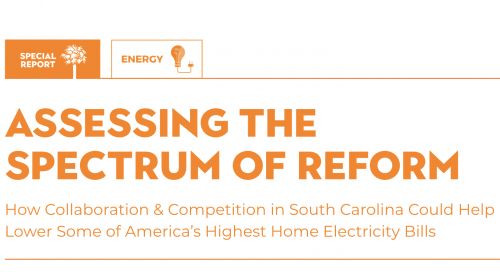Experts call for electricity reform to lower prices for ratepayers in South Carolina
The Center Square highlights PPI’s “Assessing the Spectrum of Reform” report.
(The Center Square) — South Carolina continues to have some of the country’s most expensive energy bills and one group is suggesting solutions for the issue.
Palmetto Promise’s Oran Smith and two economists wrote a paper outlining multiple options that South Carolina could utilize to lower costs. The report coincides with a state committee doing work looking at potential solutions and Duke Energy Carolinas announcing a 13.2% increase in residential energy bills. Duke blamed the increase on rising fuel costs and usage.
“We thought, at some point, we should get back around to getting a feel for what a bigger picture of that was and see what options there might be for doing something about that,” Smith said. “Because it’s not good for a state to struggle with their residents, many of whom are poor. Our average resident is not a person of wealth. So high bills and low per capita income was a problem.”
Smith noted that, in 2016, South Carolina had the highest energy bills in the country and it has been in the top five often since. Also, this is the fifth anniversary of the V.C. Summer nuclear plant shutdown and Nippon Denkai recently announced it would move its expansion from Camden, South Carolina, to Augusta, Georgia, partially due to lower electricity costs in Georgia.
“If you look at prices paid in cents per kilowatt hour, it’s been creeping up, particularly for South Carolina,” Smith said. “South Carolina is in the top one-fourth — and in some cases No. 2, No. 3 or No. 4 — in the price paid. So, not only are the bills high but the price per kilowatt hour is high in South Carolina, particularly compared to our competitors, North Carolina and Georgia, for whom we compete for economic development.”
The policy paper suggests 11 reform options, something Smith believes can be considered by the General Assembly’s Electricity Market Reform Study Committee.
Those considerations include breaking up the monopoly and duopoly and open up more options to consumers. It also suggests either a southeast regional cooperative on electricity to create a wholesale system or a Regional Transmission Organization, which is a multi-state organization with a shared grid allowing sales of electricity between utilities.
Palmetto Promise worked with The Conservative Energy Network on the paper.
“The competition-centered model used in Texas is king when it comes to forcing electricity prices down, but Regional Transmission Organizations have been successful as well,” said CEN Interim CEO Brittany Zwierzchowski Tisler. “CEN strongly believes that every option should be on the table.






